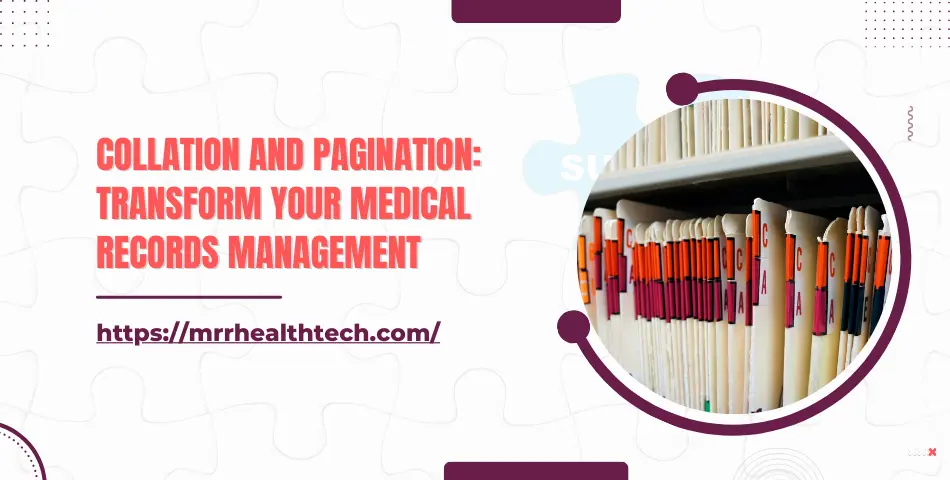
Introduction
Medical records are the backbone of healthcare and legal practitioners for accuracy, efficiency, and adherence. Managerial duties regarding vast amounts of medical documentation can become cumbersome. Thus, proper collation and pagination should always be useful for enhancing the analysis of medical records and cross-times when reviewing medical cases. Whether they are legal medical records, insurance medical records, or malpractice cases, a well-organized system improves the entire workflow by minimizing errors regarding medical records.
This article will describe collation and pagination, their roles in medical documentation, and the best means to enhance medical records management for healthcare organizations, lawyers, and insurers.
Understanding Collation
Collation refers to the assembling of medical records, organized by a workflow in a sequential numbering system. This will guarantee that documents are properly arranged for fast retrieval: medical records sorting or medical records indexing.
Benefits of Proper Collation:
- Keep documents in chronological order so that case reviews can be accurate.
- Allows for easy access to legal evidence that may be needed for personal injury medical records and disability claim records.
- Help increase the ability to trace lost documents.
- Enhances the efficiency of organizing medical records and facilities for quick access by health and legal professionals.
The Role of Collation in Healthcare and Legal Sectors
Different sectors rely on effective collation:
- In health, it is providers who manage health documentation so that patient records are structured for an accurate diagnosis and treatment.
- In law, collated legal medical records are used for litigation by attorneys, particularly in malpractice case records and personal injury claims.
- Insurance properly collated discrepancies in claims being assessed against the medical record of the insured and thus speed up claims processing.
Exploring Pagination
Pagination is the numbering of the pages in regular and sequential order for easier reference and navigation. This process is crucial to medical document organization, as it increases the accessibility and traceability of records.
Why Pagination Matters:
- Hinders duplication and loss of critical medical documentation.
- Increased efficiency of medical records through fast references.
- Strengthens HIPAA compliance for maintaining confidentiality and accountability.
- Flexibility goes as far as being legal proof, particularly amidst scenarios working hard to attain accuracy in the medical record.
Enhancing Usability through Pagination and Its Legal Considerations
When dealing with legal medical records, precise pagination is important for compliance and admissibility in court. Medical records workflow must synchronize with HIPAA compliance for safeguarding patient information and keeping intact the integrity of legal evidence.
Best Practices for Pagination:
- Sequential numbering for easy tracking and referencing.
- Numbering of digital versus physical records.
- Format conformity among all medical documentation.
- Verify pagination to avoid errors in medical records.
- Separate paginated sections for medical case review
Technology in Collation and Pagination
With the digital transformation of healthcare and legal industries, medical records management is proficiently automated. Advanced software solutions now offer:
- Collation and sorting automated to ensure fast indexing of medical records.
- Electronic pagination allows the easiest navigation between digital and physical records.
- OCR (Optical Character Recognition) to digitize handwritten healthcare documentation.
- Cloud storage facilitates safe access to medical documentation anywhere.
Best Practices for Effective Medical Records Management
To streamline medical records setup, follow these best practices:
- Follow standardized collation methods to improve medical documentation consistency.
- Make use of automation tools to push the efficaciousness of medical records.
- Audit records regularly so that medical record discrepancies are isolated and rectified.
- Ensure that HIPAA regulations are complied with to provide confidentiality to patients.
- Ensure staff are versed in proper collation and pagination techniques to enhance workflow.
Conclusion
Collation and pagination are crucial to medical records workflow for organized, error-free documentation. Whether dealing with disability claim records, personal injury medical records, or records of malpractice cases, an organized approach leads to enhanced medical record accuracy and legal compliance.
Using technological advancement concerning medical record management, practitioners can streamline processes and reduce errors while improving efficiency. It’s time to put these best practices into operation for running your medical documentation program!
Looking for expert help in organizing and reviewing your medical records? We are just a click away from seamless assistance!













